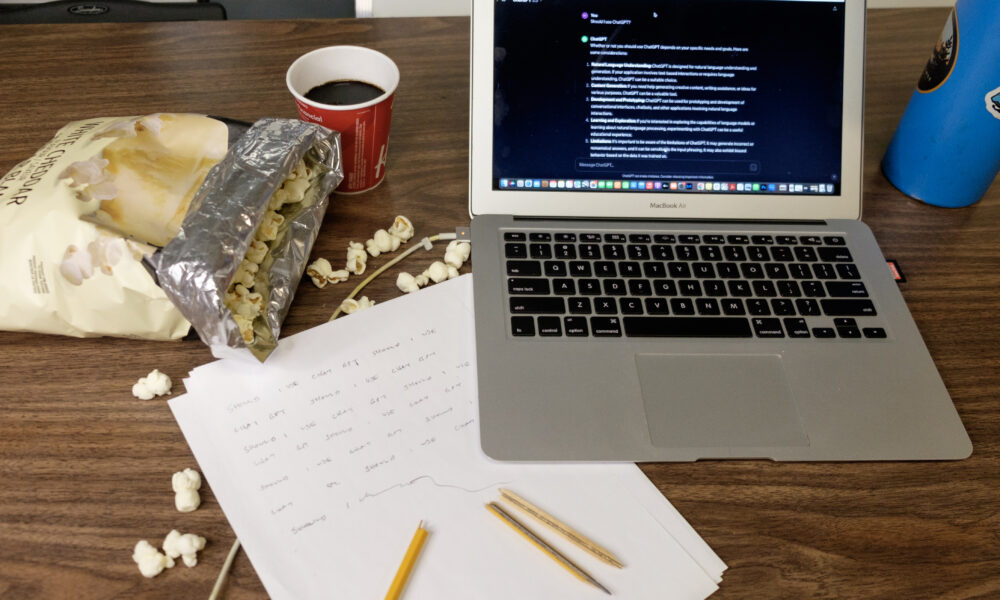AI writing tools have caused an unforeseen plot twist in the evolving narrative of writing, ushering human writers into a thrilling new chapter of creativity. Yet, this new frontier calls for a thoughtful approach, and writers must explore AI’s possibilities with caution and consideration. Once upon a time, there was a sense of certainty that everything we read was written by another person. The fact that the first two unedited sentences of this article were generated by OpenAI’s ChatGPT shows that this is no longer the case.
In this week’s ‘McGill and AI’ series installment, The Tribune interviewed Lucia Linaje-Ferrel of the McSway Poetry Collective and Vishwa Srinivasan of The Bull & Bear to gain insights into AI’s growing influence in the university and industry writing spheres.
Srinivasan, U2 Desautels, is the Business and Economy Editor for The Bull & Bear. He has observed a growing familiarity and interest in AI on campus and among student journalists.
“I think pretty much everyone I know uses some form of generative AI tools, most commonly, of course, ChatGPT,” he noted.
Linaje-Ferrel, U3 Arts and Co-President of McSway, conversely, has noticed a more cautious approach within creative writing circles.
“I feel like there’s some tentative exploration. As long as it’s just play, people are willing to do it,” Linaje-Ferrel said. “But, I definitely don’t get a sense of people throwing themselves at AI.”
With an estimated one in three students having used ChatGPT to write an assignment, AI has drastically changed how students learn. In a lecture at Cambridge, OpenAI CEO and Co-founder Sam Altman insightfully compared restrictive policies on AI usage to the initial classroom bans on Google and Wikipedia. Although archaic notions by today’s standards, the same arguments are resurfacing in conversations around AI tools.
“Cracking down on AI seems a little misguided,” Srinivasan explained. “Generally, people our age, at least among the student community, have a good understanding of what AI is good for, and what AI is not very good for.”
Linaje-Ferrel similarly highlighted the challenges of managing AI use on campus.
“Just today, I had a class where the professor told us that we were not allowed to use AI in our essays. The fact is that these policies trying to regulate AI are all so new. It’s at a very early stage where it’s difficult to know what’s gonna happen next.”
Outside of academia, there is growing concern over the potential of AI to displace writers across industries.
“Some Bloomberg reporters, for example, those that report on acquisitions or stock trends, can be replaced,” Srinivasan said. “That’s one of those tasks that can be automated. People that write user manuals, they might have their jobs taken away.”
Linaje-Ferrel has also observed AI’s growing presence in creative publishing spaces.
“I do get the sense that some writing is kind of up for grabs. It’s a question of whether or not people who sell products really put [AI-written content] up for sale,” Linaje-Ferrel said. “[For example], you can clearly tell that some publishers switched from using a human translator to AI.”
Reid Hoffman, LinkedIn’s CEO, recently released Impromptu, a book entirely written by ChatGPT. Its mostly positive reception showcases AI’s impressive and rapidly improving abilities.
“We might see a lot of AI-generated books on the shelves, even if they don’t have good writing, which is kind of weird to think about,” Linaje-Ferrel added. “When we see AI, as creative people, we see it as a challenge to the human element of creativity, and also to career opportunities.”
Integrating AI into writing is not just about adapting a new tool; it is about redefining the partnership between creativity and technology—where AI becomes an ally in the pursuit of storytelling and truth. In this unfolding tale of technological evolution, educators and young writers are well-positioned to author the future, dictating our relationship with AI in the chapters to come.









